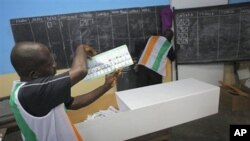Voting in Ivory Coast's volatile western region was peaceful on Sunday, despite concerns that local militias or candidate supporters might disrupt the presidential poll. In Guiglo, security forces and local residents remain on alert as votes are counted and results are announced.
After five years of repeated delays, Ivorians went to the polls for their first presidential election since the start of a rebel insurgency in 2002 that split the country between the government-held south and the rebel-held north.
Powder keg?
The Moyen-Cavally region was a focal point of the western conflict. Local militias fought on the side of government troops. Rebels in the north as well as militias in the west and south of the country have yet to disarm or reintegrate into the army.
Candidate and president, Laurent Gbagbo, who is running on behalf of the Presidential Majority, is said to have strong support in Moyen-Cavally.
Violence involving militias and youth groups close to the president has broken out repeatedly in Guiglo, including in January 2006, when armed protesters stormed the base of United Nations peacekeepers, forcing them out of the city.
One resident calls Guiglo "a powder keg."
The teacher, who asks not to be named, says that when they announce provisional results for Sunday's vote, if Mr. Gbagbo is not one of the two front-runners, the situation will become even more tense in Guiglo.
Fear of violence
Residents say they fear that youth leaders unhappy with provisional results could take to the streets in violent protests.
Last week, supporters of opposition candidate Alassane Ouattara and those of President Gbagbo clashed in Guiglo, preventing the opposition candidate from attending a campaign rally.
Both campaigns say it was an isolated incident that was quickly resolved. But residents say it reflects volatility in the region.
Polling stations in Guiglo and surrounding villages were patrolled on Sunday by Ivorian security forces supported by U.N. peacekeepers.
Lawlessness
In a report released last month, Human Rights Watch said the country's far western regions, including Moyen-Cavally, are characterized by a breakdown of the rule of law and that armed, masked bandits continue to assault, rob and rape local residents with impunity.
The international human rights monitoring group says the lawlessness has its roots in the Ivory Coast conflict and subsequent failed disarmament in the West.
International Crisis Group West Africa analyst Rinaldo DePagne says the situation in the western part of the country is complicated by its proximity to Liberia.
In Moyen-Cavally, Depagne says, there still are many people who have not been disarmed.
The militias, however, say they have disarmed and that they are awaiting government assistance to reintegrate into civilian life.
General Glofiei Maho, who was one of the militia leaders in Moyen-Cavally, says his group laid down thousands of weapons three years ago, as part of peace agreements.
Maho says the militias disarmed and no longer exist. But, he says, that does not mean that individuals cannot still rise up of their own and cause problems. Maho, who is also the traditional chief of the We ethnic group in the region, says he called for calm during the voting process.
Fragile times
As the polls closed Sunday evening in Guiglo, Eric Diabate, 18, said he did not think there would be problems, but he understood peoples' concerns.
Diabate says it is a fragile time, so tensions exist and people are worried. Diabate says people heard rumors they would be attacked or prevented from voting, but there was no violence. Still, he says, people will be worried until the results are announced.
Ivory Coast's electoral commission has until Wednesday to announce provisional results.
Voters in Ivory Coast's Western Region Cautiously Await Election Results




